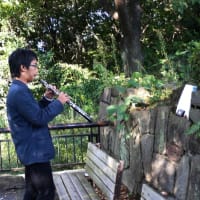A conversation with an Englishman (Ⅲ)
― The camera enthusiast -
・Malandro, you’re a camera enthusiast, aren’t you?
・Oh, I like the camera very much. But I don’t think so. Why do you think that?
・Because you have an antique camera today.
・Antique! Are manual-focus cameras antique now?
・Almost all cameras you see are auto-focus these days.
・I bought this less than twenty years ago. I often use an older one with a mechanical shutter even today.
・How different are they?
・An electric shutter camera has an easy exposure function.
・Technology progresses so quickly nowadays.
・Sure, especially in the electronics field, the progress is remarkable.
・Why do you use the older one? Isn’t it a bit of a bother for you?
・No, it’s not so difficult. EE function is not always useful especially when it comes to using positive color film.
・Why? Why when you use positive film?
・EE function turns white snow to grey, dark suits to grey, too.
・Do you use an auto-focus camera, too?
・What shall I answer? I have a digital compact camera. All digital cameras are auto-focus. But I don’t have an auto-focus SLR(single-lens reflex camera).
・Wouldn’t it be useful for you?
・I think it would be very convenient. But I’m not so rich that I can buy new products one after another.
・Do you find some bad points with auto-focus SLRs?
・No, when auto-focus cameras first went on sale, I thought that estimate-driving focusing cameras would appear soon. Soon after, all auto-focus SLRs had a estimate-driving focusing mode. Then, they were very useful especially in sports news photography or animal photography. Besides, telephoto lenses have become too heavy now because the auto-focus system can work with brighter lenses than F5.6.
For professional photographers who use super telephoto lenses fixed on a tripod, their weight is not a problem. I use a couple of 100~300mmF5.6 zoom lenses once in a while, and when I need to use more than 300mm, I always use a rear conversion lens to lengthen it’s focal length. Rear conversion lenses are very compact, light and cheap.
・What is a rear conversion lens?
・One puts it between the lens and camera body, and it expands the image 1.4 or 2.0 times.
・Does it have any faults?
・It darkens the image. Then, we can use it only for big calibre lenses, for example, 400mmF2.8 etc. when we use it with an auto-focus camera.
・ You’ve only told me about a special case. Is the auto focus camera more useful in everyday cases?
・I don’t believe that the auto-focus function always works correctly when I need it. For example, it’s very difficult to focus on the surface of someone’s face against a backlight. In this case, the face is perfectly dark. We can only see a silhouette. I think that the camera might focus only on the outline of the silhouette. In this case, I try to focus on the outline, and adjust the focus point according to my intuition.
・You surely are a camera enthusiast as I thought.
・No, I don’t think so. Because, I have only SLRs. I take pictures in fixed perspective of the camera.
・What do you mean?
・We have the perspective of centering our eyes. Camera has the perspective of the distance from surface to surface.
・I can’t follow you. Can you put it simply, or give actual examples.
・When we see a wide fence, the sides of the fence look smaller to our eyes because the sides are far from our eyes. But when we take a picture of the fence with a super-wide-angle lens, the picture keeps its rectangle. Because, the surface of the fence edge keeps at the same distance from the extended surface of the film. Then, when we look at a view through the super-wide-angle lens, both sides of view through the finder look expanded. I’ve often heard it said that the wide-angle lens also has distortion. But it’s not distortion. It’s an optical illusion caused by the difference between our human perspective and the photographic one.
Also, the top of a high tower looks small to our eyes, but we can expand it on the photo-image by shifting the lens parallel when we use a sheet film camera.
・I understand. You’d like to say that the real camera enthusiast is such a man who has a sheet film camera and take pictures freely in various perspectives as he wants.
・Now, I’ve said too extreme an opinion. We could shift the lens horizontally or vertically with the SLRs more than forty years ago, and today we can tilt the lens with some maker’s SLRs.
Rather, I‘d like to say that I use cameras only for recording my life. I’m not concerned with taking artistic or technical images at all.
・For example?
・For example, to photograph a star’s tracks or a stream with blurred white water using a long exposure. We never see such spectacles in our life. I sincerely respect such people who find those special effects in photography. But I don’t want to take such scenes. I want to take such sights for my reminiscence that I’m moved by or I like.
・So, why do you have so many lenses for the purpose of taking simple pictures such as they are.
・Not such as they are. Possibly such as I see.
Imagine, there is a pretty lady at sunset. We can see her face, and when we turn our eyes to the sunset, the Sun looks very big. However, when we take her picture, we can only exposure her face properly using a flash, but the Sun behind her is only small point in the picture. If we want to get a picture such as we see, we have to take the photo from a long distance with a telephoto lens and with a strong flash.
・So, Malandro, are you happy when you are taking pictures or cleaning cameras?
・Yes I am.
・I think you are a real camera enthusiast after all.
・I can’t deny it now. By the way, I’m not a good photographer at all, believe me.
・Ah, Surely? ・・・Believe you・・・! ( March,’05. Malandro)
― The camera enthusiast -
・Malandro, you’re a camera enthusiast, aren’t you?
・Oh, I like the camera very much. But I don’t think so. Why do you think that?
・Because you have an antique camera today.
・Antique! Are manual-focus cameras antique now?
・Almost all cameras you see are auto-focus these days.
・I bought this less than twenty years ago. I often use an older one with a mechanical shutter even today.
・How different are they?
・An electric shutter camera has an easy exposure function.
・Technology progresses so quickly nowadays.
・Sure, especially in the electronics field, the progress is remarkable.
・Why do you use the older one? Isn’t it a bit of a bother for you?
・No, it’s not so difficult. EE function is not always useful especially when it comes to using positive color film.
・Why? Why when you use positive film?
・EE function turns white snow to grey, dark suits to grey, too.
・Do you use an auto-focus camera, too?
・What shall I answer? I have a digital compact camera. All digital cameras are auto-focus. But I don’t have an auto-focus SLR(single-lens reflex camera).
・Wouldn’t it be useful for you?
・I think it would be very convenient. But I’m not so rich that I can buy new products one after another.
・Do you find some bad points with auto-focus SLRs?
・No, when auto-focus cameras first went on sale, I thought that estimate-driving focusing cameras would appear soon. Soon after, all auto-focus SLRs had a estimate-driving focusing mode. Then, they were very useful especially in sports news photography or animal photography. Besides, telephoto lenses have become too heavy now because the auto-focus system can work with brighter lenses than F5.6.
For professional photographers who use super telephoto lenses fixed on a tripod, their weight is not a problem. I use a couple of 100~300mmF5.6 zoom lenses once in a while, and when I need to use more than 300mm, I always use a rear conversion lens to lengthen it’s focal length. Rear conversion lenses are very compact, light and cheap.
・What is a rear conversion lens?
・One puts it between the lens and camera body, and it expands the image 1.4 or 2.0 times.
・Does it have any faults?
・It darkens the image. Then, we can use it only for big calibre lenses, for example, 400mmF2.8 etc. when we use it with an auto-focus camera.
・ You’ve only told me about a special case. Is the auto focus camera more useful in everyday cases?
・I don’t believe that the auto-focus function always works correctly when I need it. For example, it’s very difficult to focus on the surface of someone’s face against a backlight. In this case, the face is perfectly dark. We can only see a silhouette. I think that the camera might focus only on the outline of the silhouette. In this case, I try to focus on the outline, and adjust the focus point according to my intuition.
・You surely are a camera enthusiast as I thought.
・No, I don’t think so. Because, I have only SLRs. I take pictures in fixed perspective of the camera.
・What do you mean?
・We have the perspective of centering our eyes. Camera has the perspective of the distance from surface to surface.
・I can’t follow you. Can you put it simply, or give actual examples.
・When we see a wide fence, the sides of the fence look smaller to our eyes because the sides are far from our eyes. But when we take a picture of the fence with a super-wide-angle lens, the picture keeps its rectangle. Because, the surface of the fence edge keeps at the same distance from the extended surface of the film. Then, when we look at a view through the super-wide-angle lens, both sides of view through the finder look expanded. I’ve often heard it said that the wide-angle lens also has distortion. But it’s not distortion. It’s an optical illusion caused by the difference between our human perspective and the photographic one.
Also, the top of a high tower looks small to our eyes, but we can expand it on the photo-image by shifting the lens parallel when we use a sheet film camera.
・I understand. You’d like to say that the real camera enthusiast is such a man who has a sheet film camera and take pictures freely in various perspectives as he wants.
・Now, I’ve said too extreme an opinion. We could shift the lens horizontally or vertically with the SLRs more than forty years ago, and today we can tilt the lens with some maker’s SLRs.
Rather, I‘d like to say that I use cameras only for recording my life. I’m not concerned with taking artistic or technical images at all.
・For example?
・For example, to photograph a star’s tracks or a stream with blurred white water using a long exposure. We never see such spectacles in our life. I sincerely respect such people who find those special effects in photography. But I don’t want to take such scenes. I want to take such sights for my reminiscence that I’m moved by or I like.
・So, why do you have so many lenses for the purpose of taking simple pictures such as they are.
・Not such as they are. Possibly such as I see.
Imagine, there is a pretty lady at sunset. We can see her face, and when we turn our eyes to the sunset, the Sun looks very big. However, when we take her picture, we can only exposure her face properly using a flash, but the Sun behind her is only small point in the picture. If we want to get a picture such as we see, we have to take the photo from a long distance with a telephoto lens and with a strong flash.
・So, Malandro, are you happy when you are taking pictures or cleaning cameras?
・Yes I am.
・I think you are a real camera enthusiast after all.
・I can’t deny it now. By the way, I’m not a good photographer at all, believe me.
・Ah, Surely? ・・・Believe you・・・! ( March,’05. Malandro)
























※コメント投稿者のブログIDはブログ作成者のみに通知されます